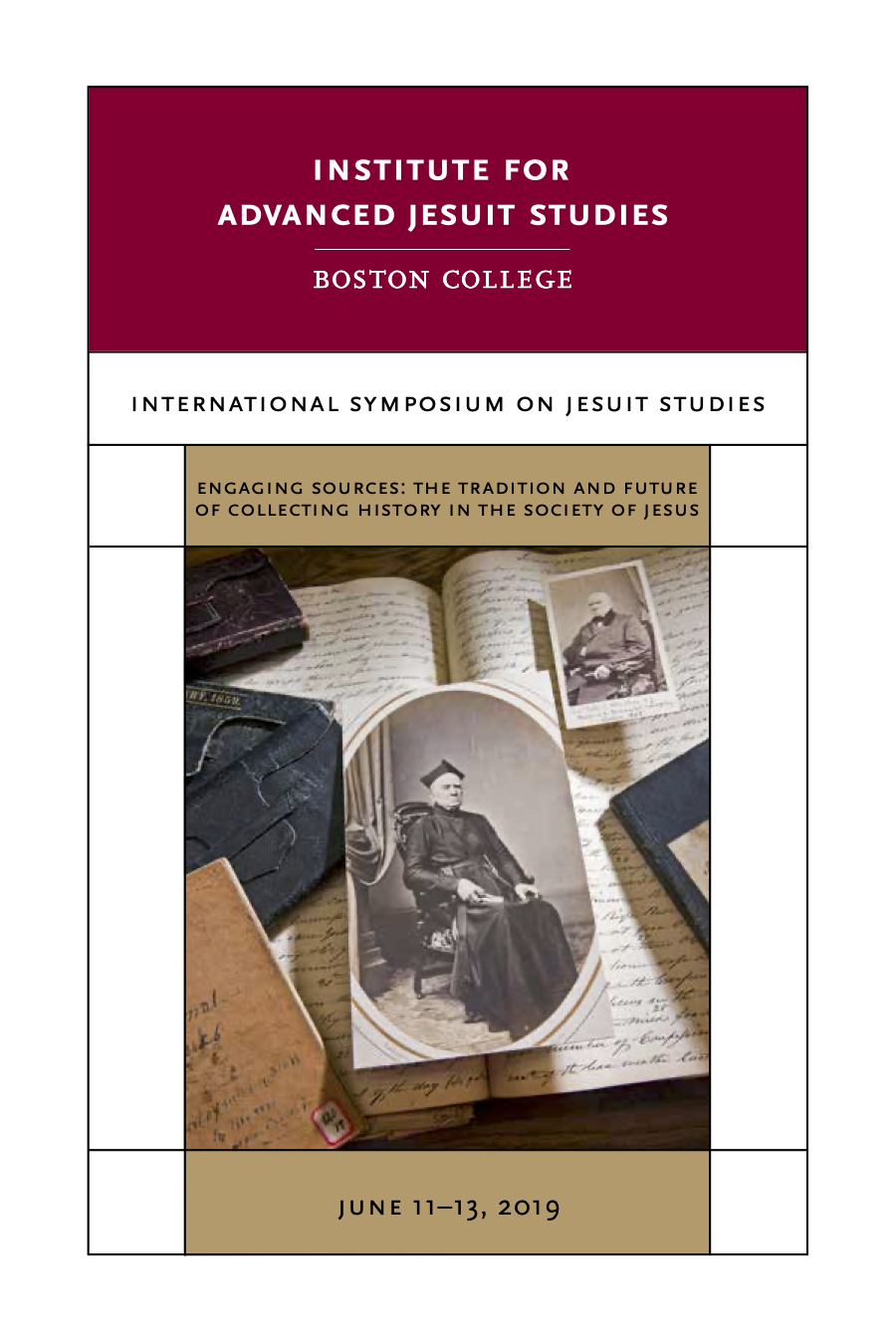Engaging Sources (2019)
|
The Institute for Advanced Jesuit Studies hosted its fifth annual International Symposium on Jesuit Studies in June 2019 at Boston College. The theme for the event was “Engaging Sources: The Tradition and Future of Collecting History in the Society of Jesus.” The keynote address was delivered by Simon Ditchfield of York University. The program featured presentations by nearly 80 other scholars, making it the largest symposium to date.
The essays below are revisions of presentations, as invited by the Institute. Each essay was subjected to a double-blind peer review and further revisions by the author. All necessary citation information for each essay appears on its downloadable pdf document. Essays will be published on a rolling basis.
— Cristiano Casalini, Emanuele Colombo, and Seth Meehan
Section 1. Jesuit Sources of Self-identificationSources used for crafting a Jesuit identity and for preserving a Jesuit past
Part 1 — Forming and Changing Identity through Print— Paul Shore, University of Regina
— Robert L. Scully, S.J., Le Moyne College
— Irene Gaddo, Università del Piemonte Orientale, Vercelli
Giovambattista Noghera (1719–84): A Jesuit Looking Back at a Great Rhetorical Tradition — Hanne Roer, Københavns Universitet
— Manfred Kraus, Universität Tübingen
Part 2 — Institutional Sources: Collections and Challenges— Markus Friedrich, Universität Hamburg
Jesuit Libraries in the Old and the New Society of Jesus as a Historiographical Theme — Noël Golvers, KU Leuven
Archiving Jesuit Libraries: Past, Present, and Future — Kyle B. Roberts, American Philosophical Society
From Tintype to Twitter: Photography at the Irish Jesuit Archives — Damien Burke, Irish Archives of the Society of Jesus
Part 3 — Race and Memory: Recordkeeping and SlaveryA Spiritual Inheritance: Black Catholics in Southern Maryland — Laura E. Masur, The Catholic University of America
Slaveholding and Jesuit Recordkeeping in the Maryland Province of the Society of Jesus, 1717–1867 — Elsa B. Mendoza, Georgetown University
— Kelly L. Schmidt, Loyola University Chicago
Part 4 — Lost Sources Found— Alexandre Coello de la Rosa, Universitat Pompeu Fabra
Sketching the Historical Soundscape of Sacred Music in China through Jesuit Sources — Li-Xing Hong, Fu Jen Catholic University
— David Salomoni, Universidade de Lisboa
History-keeping under Persecution: Sources from the College of Jesus of Coimbra, Discovered in 2016 — Margarida Miranda, Universidade de Coimbra — Carlota Miranda Urbano, Universidade de Coimbra
Section 2. Sources as Windows to Jesuit and Other HistoryScholars asking new questions of sources to better understand the past
Part 1 — Desiring the World: Litterae Indipetae of the Old and New SocietyLitterae Indipetae (1560–1773): Introduction to the Source and Quantitative Remarks — Emanuele Colombo, DePaul University — Coralys Munoz-Feliciano, Institute for Advanced Jesuit Studies — Antonio Taiga Guterres, Institute for Advanced Jesuit Studies
— Elisa Frei, Institute for Advanced Jesuit Studies
“For the salvation of Russia”: Some Brief Remarks on Russipetae in the Twentieth Century — Sabina Pavone, Università degli studi di Macerata
Part 2 — Engaging the World: Cultural Impacts— Juan Dejo, S.J., Universidad Antonio Ruiz de Montoya
The Materiality of Catholic Resistance in Sources for the English Jesuit Mission — Aislinn Muller, Institute for Advanced Jesuit Studies
Visions of Contemplation: Jesuits and Their Rhetoric of Persuasion in Japan — Aiko Okamoto-MacPhail, Indiana University
Early Modern Jesuit Writing of History as an Inspiration for Central European Historians before 1773 — Jakub Zouhar, Univerzita Hradec Králové
Jesuit Science in America: The Bulletin of the American Association of Jesuit Scientists (1922–66) — Francisco Malta Romeiras, Universidade de Lisboa
Part 3 — Engaging the World: Pedagogical ImpactsPhilosophy at the Geopolitical Service of Mission: Coimbra Jesuits’ “Wirkungsgeographie” (1542–1730) — Mário Santiago de Carvalho, Universidade de Coimbra
The Philosophy Textbooks of Portuguese Jesuits’ Courses in the 16th-Century — Paula Oliveira e Silva, Universidade do Porto — João Rebalde, Universidade do Porto
The Jesuit Philosophical Heritage in Brazil — Lúcio Álvaro Marques, Universidade Federal do Triângulo Mineiro
— Hugo Zayas-González, Central Michigan University
Part 4 — Transforming Jesuit SourcesJesuits Leaving the Classroom. A Study on the Changing Landscape of the Teaching: Workforce in Jesuit Schools in the Americas (1950–2017) — Cristóbal Madero, S.J., Universidad Alberto Hurtado
A Plea for a Jesuit Annual Catalog Database — Laura Madella, Università degli Studi di Parma
— Barbara Baudry, Archives Jésuites, Province d’Europe Occidentale Francophone — Jean Luc Enyegue, S.J., Jesuit Historical Institute in Africa
— Sergio Palagiano, Archivum Romanum Societatis Iesu |
Engaging Sources: The Tradition and Future of Collecting History in the Society of Jesus
The Institute for Advanced Jesuit Studies hosted its fifth annual International Symposium on Jesuit Studies in June 2019 at Boston College. The theme for the event was “Engaging Sources: The Tradition and Future of Collecting History in the Society of Jesus.” The keynote address was delivered by Simon Ditchfield of York University. The program featured presentations by nearly 80 other scholars, making it the largest symposium to date.
The essays below are revisions of presentations, as invited by the Institute. Each essay was subjected to a double-blind peer review and further revisions by the author. All necessary citation information for each essay appears on its downloadable pdf document. Essays will be published on a rolling basis.

